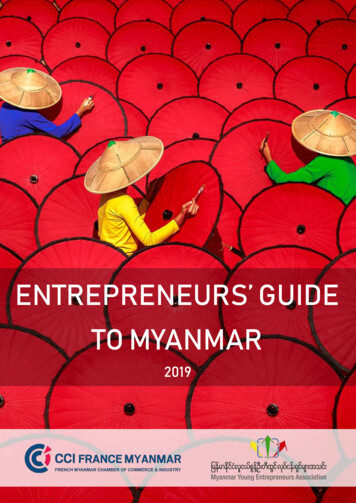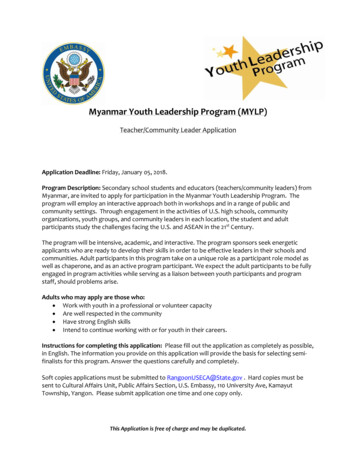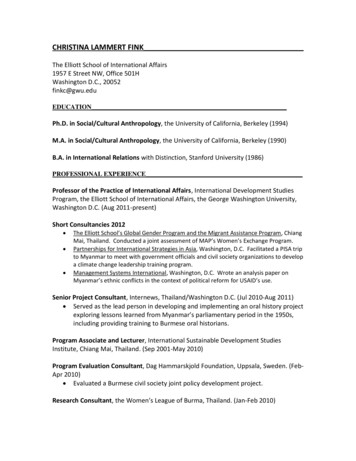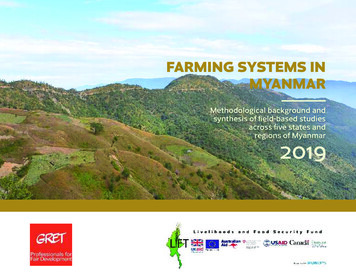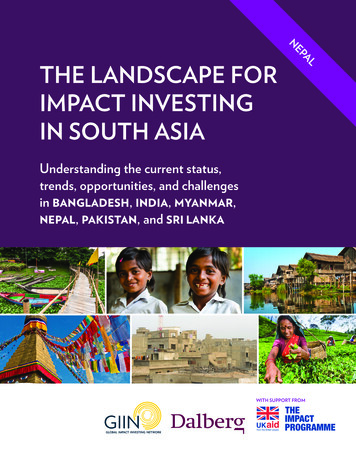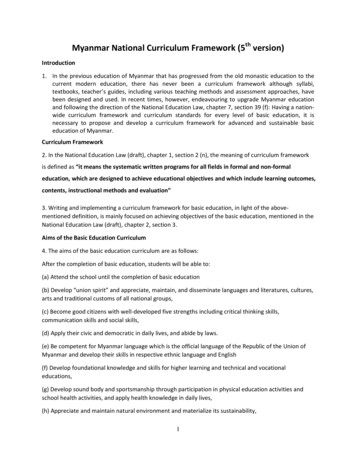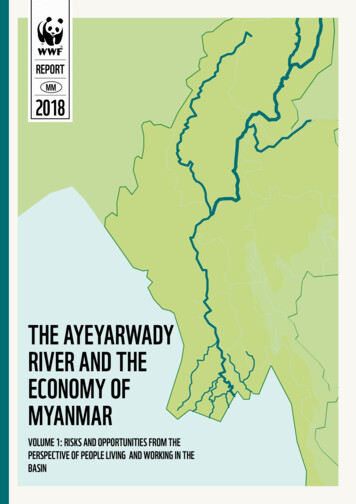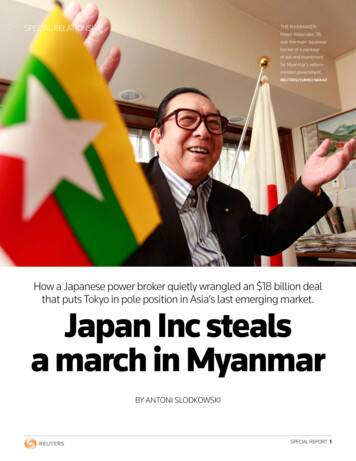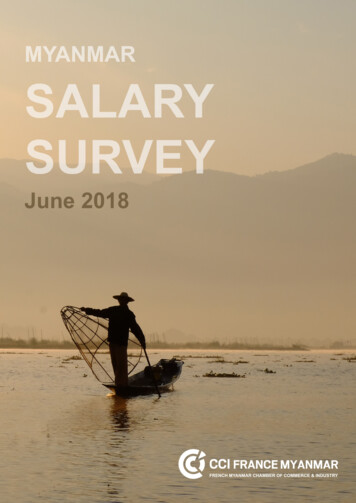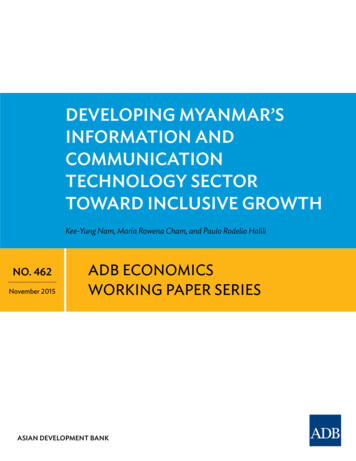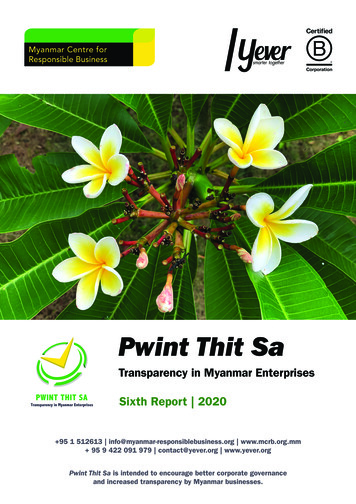
Transcription
Pwint Thit SaTransparency in Myanmar EnterprisesSixth Report 2020 95 1 512613 info@myanmar-responsiblebusiness.org www.mcrb.org.mm 95 9 422 091 979 contact@yever.org www.yever.orgPwint Thit Sa is intended to encourage better corporate governanceand increased transparency by Myanmar businesses.
Copyright Myanmar Centre for Responsible Business (MCRB) and Yever, December 2020. Publishedby MCRB and Yever. All rights reserved. MCRB and Yever permit free reproduction of extracts fromthis publication provided that due acknowledgment is given and a copy of the publication carrying theextract is sent to MCRB or Yever. Requests for permission to reproduce and translate the publicationshould also be addressed to MCRB or Yever. Media and analysts are requested to credit both MRCBand Yever when referencing this report.The Myanmar Centre for Responsible Business (MCRB) was set up in 2013 by the Institute of HumanRights and Business, and the Danish Institute for Human Rights with funding from several donorgovernments. Based in Yangon, it aims to provide a trusted and impartial platform for the creationof knowledge, building of capacity, undertaking of advocacy and promotion of dialogue amongstbusinesses, civil society, governments, experts and other stakeholders, with the objective of encouragingresponsible business conduct throughout Myanmar. Responsible business means business conductthat works for the long-term interests of Myanmar and its people, based on responsible social andenvironmental performance within the context of international standards. MCRB receives funding fromthe governments of UK, Denmark, Norway, Switzerland, Netherlands, and Ireland.TABLE OF CONTENTS—ABBREVIATIONS7EXECUTIVE SUMMARY8PART 1: INTRODUCTION13Pwint Thit Sa, Corporate Governance and Disclosure in the era of COVID-1913Supporting Governance Reform and Sustainable Development16Building Trust17PART 2: CURRENT POLICY AND REGULATORY CONTEXT FOR CORPORATEGOVERNANCE AND DISCLOSURE20State-Owned Economic EnterprisesCompanies formed under the 1950 Special Companies Act (SCA)State-owned banks202122Central Bank of MyanmarDirective on Fit and Proper CriteriaDirective on Directors of BanksDirective on External Auditors of BanksRelated Parties DirectiveDirective on Acquisition of Substantial InterestDirective on Customer Due Diligence23242424262626DICA and the Myanmar Companies LawWhat are public and private companies?Disclosure Requirements in the Companies LawAnnual ReturnStatutory reportFinancial Statements and Director’s ReportIndependent Non-Executive Directors27282929303031Securities and Exchange Commission of Myanmar (SECM)Continuous DisclosureCorporate Governance NotificationRelated Party Transactions (RPTs)3232343536The information provided in this report does not, and is not intended to, constitute legal advice; instead,all information, content, and materials are for general informational purposes only. Information in thishandbook may not constitute the most up-to-date legal or other information. Users of this handbookshould contact their lawyer to obtain advice with respect to any particular legal matter.Anti-Money-Laundering (AML), Beneficial Ownership (BO) and Politically ExposedPersons (PEPs)Beneficial Ownership in Myanmar LawBeneficial Ownership in the Myanmar Extractives Industries Transparency InitiativeRecent Developments Concerning Beneficial Ownership and Customer DueDiligenceCover photo: “Frangipani” / Vicky Bowman, p.98: Greta Cowie, p.100: Swaminathan,Myanmar Investment Commission43Myanmar Centre for Responsible BusinessNo.6 (A), Shin Saw Pu RoadKayin Chan Ward, Ahlone Township, Yangon, nmar-responsiblebusiness.org and www.mcrb.org.mmBased in Yangon, Yever is a consultancy offering custom made solutions to corporate leaders. We aimto foster their company business transformation while building their market leadership responsiblyand sustainably. We support Myanmar organisations in their journey and provide them support toenhance their corporate governance and disclosure, strengthen their performance, and develop soundmanagement practices. Established in 2016, our team combines Myanmar talents and internationalexpertise. Purpose-driven, we aim to walk the talk: we are the only B Corp certified company inMyanmar and are proud to contribute pro bono for various projects.Yever27 Aung Zeya Road,Yankin Township, Yangon, Myanmarcontact@yever.orgwww.yever.orgThe research and writing of this report was undertaken by Vicky Bowman, Phyu Phyu Zin, and MayaMuller of MCRB, and Nicolas Delange, Maddy and Wai Yan Kyaw of Yever.The views expressed in this publication are those of the authors. The mention of specific companiesdoes not imply that they are recommended by MCRB or Yever. The ranking is not intended to makejudgments to the business performance of companies.373842p.103: Thangaraj Kumaravel, p.113: Ronel Reyes Back Cover: Andrew Stewart23
Disclosure by the MICDisclosure by the Investor4444Environmental Impact Assessment45Website Assessment and Company EngagementScoringLimitations of the research methodologyResultsPART 3: EMERGING ISSUES IN CORPORATE GOVERNANCE AND DISCLOSUREIN MYANMAR4PART 5: RECOMMENDATIONS472019 Report of the Independent Fact-Finding Mission49Military-owned CompaniesMyanmar Economic Holdings Public Company LtdMyanmar Economic Corporation515153Developments in Combatting CorruptionAnti-Corruption Commission, and the Anti-Corruption LawCorruption Prevention UnitsFacilitation Payments and Better RegulationCOVID-19 and CorruptionAreas for further action to combat corruption535355565960Sustainability/ESG ReportingAn official Myanmar approach to ESG reporting?International standards and reporting frameworks for disclosure666869The role of Stock Exchanges in promoting Disclosure and SustainabilityYangon Stock Exchange7171Regulatory requirements for sustainability reporting and human rights duediligenceEuropean Union RequirementsNational requirements73Engagement with stakeholders76Corporate Philanthropy and ‘CSR’The 2014 Associations LawMandatory and Voluntary Social and Environmental Expenditure byCompanies778082Developing a Consistent Myanmar Approach to Corporate Governance andDisclosureA Myanmar Corporate Governance Code?83MethodologyMain changes in the 2020 ScorecardAlignment of Pwint Thit Sa with existing standards and frameworksSources of information consideredSelection of companies for inclusion9447Business and Human RightsPART 4: THE 2020 PWINT THIT SA REPORT: RESULTS929393104To Myanmar CompaniesTransparency and reportingDirectors and their dutiesBusiness integrity104104105106To the Myanmar GovernmentCorporate governanceTransparency and access to informationBeneficial Ownership and Politically Exposed Persons106106108109To Yangon Stock ExchangeCombatting corruption110111To the Anti-Corruption Commission111To Parliament112To Myanmar Civil Society Organisations and the Media112To the Investor Community112ANNEX 1: FULL TABLE OF RESULTS114ANNEX 2: QUESTIONNAIRE1247375848787888991915
FIGURE 1:Score breakdown by type of company9ABBREVIATIONSFIGURE 2:Evolution of Corporate Transparency in Myanmar Enterprises between2018 and 202011—FIGURE 3:The Spectrum of Corporate (Social) Responsibility, or ResponsibleBusiness Conduct79FIGURE 4:Scoring Systems for the two categories of companies89FIGURE 5:Evolution of the average scores between 2019 and 202095BOX 1:MCRB and Yever’s Partnership12BOX 2:Annual General Meetings during COVID-1914BOX 3:Business Reporting by Myanmar Now19BOX 4:Definition of beneficial owner agreed by the EITI Multistakeholder Group39BOX 5:Definition of politically exposed person agreed by the EITIMultistakeholder Group640BOX 6:Myanmar Business Environment Index 202058BOX 7:Doing Good Index 202079BOX 8:The IFC’s Myanmar Corporate Governance Initiative (MCGI)85TABLE 1:Banks’ compliance with Directive 10/201925TABLE 2:Beneficial Ownership in Pwint Thit Sa 202042TABLE 3:Coverage of ACGS level 1 criteria by Pwint Thit Sa criteria89TABLE 4:Criteria used in the 2020 scoring system90TABLE 5:ACGS and IR criteria used in Pwint Thit Sa 202091TABLE 6:Environmental and social topics disclosed by companies96TABLE 7:Top 30 Companies assessed in Pwint Thit Sa 2020 with the mostdisclosure of information98TABLE 8:Top 10 public companies in Pwint Thit Sa 2020100TABLE 9:Top 10 State-owned economic enterprises (SEEs)101TABLE 10:Banks in Pwint Thit Sa 2020102ACGSASEAN Corporate Governance ScorecardACMFASEAN Capital Markets ForumAMLAnti-Money LaunderingASEANAssociation of South East Asian NationsBoDBoard of DirectorsCDDCustomer Due DiligenceCGCorporate GovernanceCSRCorporate Social ResponsibilityDICADirectorate of Investment and Company AdministrationDNFBPDesignated Non-Financial Businesses and ProfessionsESGEnvironmental, Social and GovernanceFYFinancial YearGRIGlobal Reporting InitiativeIFCInternational Finance CorporationIIRCInternational Integrated Reporting CouncilIPOInitial Public OfferingKPIKey Performance IndicatorMCLMyanmar Companies LawMCGSMyanmar Corporate Governance ScorecardMCRBMyanmar Centre for Responsible BusinessMERPPMyanmar Economic Resilience and Reform PlanMICMyanmar Investment CommissionMIFERMinistry of Investment and Foreign Economic RelationsMILMyanmar Investment LawMIoDMyanmar Institute of DirectorsMIRMyanmar Investment RulesMoPFIMinistry of Planning, Finance and IndustryMSDPMyanmar Sustainable Development PlanMyCOMyanmar Companies Register OnlineNRGINatural Resources Governance InstituteOECDOrganisation for Economic Cooperation andDevelopmentOTCOver the Counter (an organized market for trading ofunlisted securities)SAMCOState Assets Management CorporationSASBSustainability Accounting Standards BoardSECMSecurities and Exchange Commission of MyanmarSEE/SOEState-owned Economic EnterpriseUMFCCIUnion of Myanmar Federation of Chambers ofCommerce and IndustryYMDCYangon Metropolitan Development CompanyYSXYangon Stock Exchange7
EXECUTIVESUMMARY—This is the sixth Pwint Thit Sa/Transparency in Myanmar Enterprises (TiME)report. It assesses information disclosure on the corporate websites of 260large Myanmar companies (248 in 2019). It examines publicly listed and‘public’ companies, and privately-owned companies which are influential orsignificant taxpayers, as well as smaller companies which volunteered forinclusion. As in 2019 it includes the corporate disclosure of all significantstate-owned economic enterprises (SEEs). Pwint Thit Sa remains the mostextensive public report published about the state of corporate disclosure (CD)in Myanmar.Average scores in 2020 are 7% compared to 5% in 2019: overall disclosurehas improved, with some leading companies rising to the challenge ofboth disclosing Corporate Governance (CG) information and reportingperformance.The top three companies in 2020 scoring highest for disclosure are uabbank, CMHL and Shwe Taung. These companies featured in the Top 10of the 2019 Pwint Thit Sa reports, but the order has changed, and all ofthem have made added efforts in Pwint Thit Sa 2020 to enhance disclosure,particularly on corporate governance and non-financial reporting. Indeed,this was true for the 32 companies who opted to meet (virtually) with MCRB/Yever to discuss their draft scores or to gain a better understanding of thecriteria and what they mean for company disclosure. On average, this directengagement process helped them to improve their score by 231%.The 2020 report continues with the approach adopted in 2018 by using theASEAN Corporate Governance Scorecard (ACGS) (Table 3) to rate companies’corporate disclosure. The ACGS is used widely in the region to assessdisclosure of corporate governance by large companies. It was also used in2018/19 by Myanmar regulatory bodies to develop a Myanmar CorporateGovernance Scorecard to assess the current corporate governance practicesof 24 large Myanmar companies. It has also been adopted as a disclosureframework by five further Myanmar companies (Dagon, MAEX, Max Myanmar,TMH and uab bank) joining CMHL, FMI and Shwe Taung. This demonstratesthe influence of Pwint Thit Sa in encouraging companies to align to appropriateinternational frameworks.However not all ACGS criteria have been used for Pwint Thit Sa, and someadditional performance criteria concerning sustainability and its relationshipto the company’s business model are added, aligned with the IntegratedReporting Framework IR , as in 2019. This is intended to challenge and stretchthe leading companies, and reflect and support the Myanmar SustainableDevelopment Plan and Myanmar’s achievement of SDGs 12 and 16.Listed companies, which scored average 39%, are outperforming public (5%)and private companies (7%). However, the variance within each categoryis significant: Figure 1 indicates, for each type of company, the maximum,minimum and mean scores. There are 19 companies whom we identify aschampions, which have scored higher than the average score of the listedcompanies. All the companies in the Top 20 score at least five times theoverall average score of 7%.FIGURE 1:Score breakdown by type of companyThe scoring methodology therefore uses 71 of the most relevant criteria fromthe ACGS (see Annex 2). Once again, it assesses four dimensions - CorporateProfile, Corporate Governance, Sustainability Management and Reporting- using 143 criteria (82 disclosure-based, 61 performance-based) with amaximum possible score of 204 (82 Disclosure, 122 Performance). This yeara few additional criteria on governance of philanthropy, and SDGs, were added.A few which were not considered meaningful were dropped. Furthermore, ourscorecard aimed this year to reward companies that embraced a more holisticand comprehensive approach to disclosure: a compliance-driven approachto Pwint Thit Sa was therefore not sufficient to secure the maximum scorepossible.For most companies in this study, with the exception of those who are publiclylisted and ‘public companies’ with more than 100 shareholders and banks,there is no legal requirement to disclose this information on their website underMyanmar law. However, to do so can help a company to obtain a competitiveedge with potential business partners and investors whose first research on acompany may involve looking at their website.This year, we distinguished more clearly between where companies have alegal obligation to disclose and where private companies are choosing to doso. To incentivize disclosure beyond compliance, bonus points were addedwhere companies chose to disclose information such as financial statements.Further details are in the Methodology section in Part 4.89
Figure 1 shows that the highest performing company, uab bank, is privatelyowned, not publicly listed. This shows that private companies can chooseto measure and disclose significant quantities of CG and performanceinformation. Furthermore, some private companies which have previouslynot featured in the Top 20 have joined it in 2020 such as Yoma Bank,IME Group, Alpha Power Engineering, Proven Group and Maha AgricultureMicrofinance. This demonstrates that Pwint Thit Sa has had an impactin encouraging Myanmar companies to raise their game on corporategovernance, disclosure and sustainability. This has been reinforced by theinterest which international investors and business partners are showing inthese issues and the reforms which Myanmar is undertaking, particularlythe 2017 Myanmar Companies Law.FIGURE 2:Evolution of Corporate Transparency in Myanmar Enterprises between 2018 and2020SEEs are the poorest performing category. The leading SEEs for disclosureare Yangon Electricity Supply Corporation (YESC) and Myanmar Shipyards.Because of the special nature of these companies, and the corporategovernance challenges they face, they have also been ranked separately(Table 9), using the same methodology. SEEs will need to enhance corporategovernance and disclosure under the reforms envisaged by the 2018Myanmar Sustainable Development Plan and the forthcoming MyanmarEconomic Recovery and Reform Plan (MERRP).The main area of strength amongst the leading companies is CorporateGovernance, with an average score of 129% for the top 10; bonus pointsfor private companies voluntarily disclosing on specific dimensions led themto score above 100%. The weakest areas are Reporting and SustainabilityManagement with an average score, respectively, of 56% and 55% for thetop 10.Of the 260 companies surveyed, 98 (38%) still do not have a corporatewebsite or do not disclose anything at all (in black in Figure 2) comparedto 44% in 2019. Even where companies do have websites, many of thempublish little or no data relating to the criteria covered in this survey. Ofthose companies which disclosed corporate information (including SEEs),44% of those assessed scored less than the overall average score for allcompanies assessed (in orange in Figure 2).As ever, this survey and the ranking it produces is limited by the fact thatit only uses publicly available information provided by the companies. Itdoes not assess the quality or detailed performance of the company orthe accuracy of the data, something which requires the assurance of anindependent expert audit. This year, however, we incorporated a new slidingscale (0,1,2) for some criteria relating to policies and sustainability toreflect how closely commitments were genuinely aligned to the business.Furthermore, our direct engagement with companies suggested that thosewho have higher scores are also those developing a stronger corporategovernance culture and understanding of sustainability.Part 1 of the report introduces the current context, including the impact ofCOVID-19 on governance and disclosure in Myanmar. As previously, Part2 of the report summarises the context for disclosure, transparency andcorporate governance in Myanmar from a policy, regulatory and stakeholderperspective. This background information is provided with the intention of10raising awareness and encouraging compliance. It is also intended to supportcorporate governance capacity-building initiatives such as those beingundertaken by Directorate of Investment and Companies Administration(DICA), the Central Bank of Myanmar (CBM), and Myanmar Securitiesand Exchange Commission (SECM), including those related to beneficialownership/politically exposed persons, and anti-money laundering, and topromote a more coordinated approach.Part 3 highlights some of the emerging issues for corporate governanceand transparency internationally which are of relevance to Myanmar, suchas human rights due diligence, combatting corruption, and sustainabilityreporting, including on gender. It also addresses the consequences of thereport on military economic interests issued in August 2019 by the UnitedNation’s Independent Fact-Finding Mission on Myanmar, and examinesthe corporate governance of the two military-owned conglomerates whichfeatured in that report.Part 4 reveals the 2020 Pwint Thit Sa results and explains the methodology.Finally, Part 5 includes recommendations for Myanmar companies,11
government, the Anti-Corruption Commission, Parliament, institutionalinvestors and civil society and the media. These are intended to enhancecorporate governance and transparency.In these times of COVID-19, nothing is certain. But MCRB and Yever planto use 2021 to support interested companies to improve their policies,reporting, disclosure, and website accessibility – including for persons withdisabilities – complementing the training provided by the Myanmar Instituteof Directors on corporate governance. Our plan is to publish the next PwintThit Sa report in 2022.BOX 1:PART 1:INTRODUCTION—The objective of the Pwint Thit Sa2/Transparency in Myanmar Enterprises(TiME) report is to incentivise greater publication of corporate governance(CG) and other information by Myanmar companies through publiclyrecognising them for their disclosure and transparency. MCRB published itsfirst report in July 2014, and further reports were published in 2015, 2016,2018 and 2019.Since 2018, the report has covered an expanded number of companies,and used criteria aligned with the emerging corporate governance agendain Myanmar, and specifically the ASEAN Corporate Governance Scorecard(ACGS). As in 2018 and 2019, this report has been jointly authored byMCRB and Yever, whose contribution is pro bono (see Box 1).disclosure.1Pwint Thit Sa remains one of MCRB’s most popular reports, with over 6,000downloads of the 2019 report in English (compared to 2,000 of the 2018report) as well as around 2000 MM and 1400 EN hard copies distributedto stakeholders in, and visitors to, Myanmar, including foreign and Myanmarcompanies, government Ministers and officials, parliamentarians and civilsociety organisations. It has received extensive media coverage and has alsoserved as a reference point for international organisations and companiesconducting due diligence. High-scoring Myanmar companies have publicisedit in their annual reports and websites and even on their ATM machines!Furthermore, some banks and other institutions use Pwint Thit Sa ranking toassess risks before granting loans or providing financing.MCRB and Yever’s PartnershipWho is Yever? Yever is an independent and purpose-driven business consultancy, whichaims to enable Myanmar business leaders in embracing more responsible and sustainablepractices. In 2018 MCRB decided to join forces with this new Myanmar-based businesssustainability consultancy, whose Director, Nicolas Delange, had been conducting a similarprivate benchmarking exercise of sustainability reporting indicators of Myanmar companiesfor several years. Nicolas Delange has also supported the IFC on the SECM corporategovernance scorecard initiative, and works for IFC as a consultant on corporate governancesince November 2017.Respective roles: As in 2018 and 2019, for Pwint Thit Sa 2020, MCRB managed therelationships with the companies that were analysed during the project. Yever performedthe assessment for each company (on a pro bono basis, which included around 300 daysof pro bono work), and compiled the feedback on draft scores. MCRB and Yever thenprovided this to the companies, and where companies asked for it, provided pointers forimprovement.PWINT THIT SA,CORPORATEGOVERNANCEAND DISCLOSUREIN THE ERA OFCOVID-19COVID-19 restrictions had a practical impact on the production of this year’sreport. All interactions with companies other than February’s launch wereconducted online. However, despite, or perhaps because of this, engagementwith company senior management has increased, and 11 companieswhich had not previously engaged with Pwint Thit Sa took advantage of theopportunity of a meeting to discuss their draft score.Conflict of Interest Declaration: Yever provided paid consultancy services in 2020 to 6companies included in the Pwint Thit Sa 2020 report namely Alpha Power Engineering,City Mart Holdings Limited, IME Group, Shwe Taung Group, TMH and Yoma Bank. To avoidconflict of interest, their final scores were independently checked by MCRB. All companieswere provided with the same information and the same offers of dialogue and deadlineextensions where requested.—The pandemic-driven shift to working more online further underlines theimportance of companies maintaining an informative and accurate onlinepresence through a website. Furthermore, corporate governance itself hasshifted online, with Board meetings and AGMs conducted electronically, whichcan even increase shareholder participation. The Singapore governmentissued guidance and provided authority to hold AGMs electronically duringCOVID, and redefined what constitutes a quorum.3 Japan is planning changesto its Companies Act.4 DICA did not provide guidance, but a number ofMyanmar companies decided to go online anyway (see Box 2).Practice what you preach: MCRB and Yever both benchmarked their own disclosedinformation against the same criteria as the companies. MCRB’s overall score is 17%,equivalent to 28th, while Yever’s overall score of 16% places them 30th. Although thesurvey questions were designed for large enterprises, these scores show that many of thedisclosure criteria for the ASEAN CG Scorecard can be applicable even to micro-enterprises(MCRB has 17 employees, Yever has 8). Yever is also the only certified B Corp member inMyanmar, demonstrating its own commitment to sustainability and disclosure.1Furthermore, COVID-19 has thrown a spotlight on companies’ resilienceand risk management processes, such as safety, business continuity plans,and human resource management. The Myanmar government’s loans to23112bcorporation.net/directory/yever4Pwint Thit Sa means ‘new blooms’ (and figuratively, ‘new talent’). The name waschosen to reflect the emergence of transparency and corporate governance practicesin Myanmar after 2012.COVID (Temporary Measures) Act 2020: Alternative arrangements for meetings forcompanies, variable capital companies, business trusts, unit trusts and debentureholders, Order 2020, Minister for Law, SingaporeSpurred by COVID, Japan seeks fully online shareholder meetings, Nikkei Asia 19November 202013
businesses have required them to show their governance documents,financial statements and tax returns.5 This has further highlighted the valueof compliance and having reliable accounts and other documentation.BOX 2:Annual24th JuneAGM6GeneralMeetingsto the publicduring COVID-197On 6 February 2020, listed company FMI published a health and safety update fortheir 28th AGM, due to be held on 17 February in which they announced measures toprevent possible spread of COVID-19 attendees. They cancelled stalls and gifts whichmight encourage AGM attendance, established temperature screening and offeredshareholders the option of attending via “live streaming” on their website and Facebook,and to send in comments or queries on the annual report by 14 February, as well ProxyForms. Another listed company, Myanmar Thilawa SEZ Holdings, went straight to Zoomand Facebook live for their 24 June AGM and arranged online voting.6 The entire AGMremains available to the public.7Myanmar Institute of Directors (MIOD) took a similar approach to their first AGM on 25June. Its AGM mailing, three weeks in advance, actively encouraged the 200 membersto appoint the (unnamed) Chair of the AGM, or someone else who would attend, astheir proxy, so as to reduce attendance numbers, and submit any questions in advance.A limited number of people (4 members, including the Board member acting as AGMChair, auditor, secretariat) attended the meeting in person, in line with COVID-19social distancing guidelines. Around 30 members participated using Microsoft Teams.Additionally, MIOD used online voting software (ElectionRunner) to pre-select the slateof candidates to be put to the AGM for a vote, and achieved a turnout of 68%. Sinceonline AGMs and Boards are likely to be the ‘new normal’ companies should reviewtheir Constitutions to ensure that they allow for the possibility to run meetings in thisway and establish a quorum.Many Myanmar companies lack management capacity, as well as dedicatedfunctions for risk, corporate governance and compliance to enable them toplan, respond to and report on crises such COVID. The IFC has publishedguidance for both listed and privately-owned companies on what toconsider and how to disclose what they are doing to manage the economic,environmental, and social impacts of the pandemic.8 This uses the IFC’sDisclosure and Transparency Framework,9 which is focused on strategy,5678914Documents which companies are required to show to be eligible for COVID loansinclude Company Registration Certificate, Shareholders list, Director List, Meetingminutes and Decisions of Meeting (original document), company constitution, MyCohistorical company extract, last two years of tax receipts and financial statements,as well as business plans, bank statements and employee lists. SMEs not registeredon MyCo must show a municipal or other licence, as well as financial records, taxreceipts and business plan. See COVID fund documents, DICAMTSH will hold its 7th Annual General Meeting online, MTSH 320532561Disclosure and Transparency during COVID, Corporate Governance Tipsheet, IFC,2020Beyond the Balance Sheet - IFC Toolkit for Disclosure and Transparency, IFC 2018governance, and performance. The framework promotes the issuance ofstandardized corporate reports and data, and provides investors and keystakeholders with the information they need to assess company resiliency,preparedness, and continued management of material environmental,social, and governance (ESG) issues both during and after the crisis.As one private equity investor based in Myanmar told MCRB:“In Myanmar, the immediate public health impacts of Covid-19 will likely bematched or exceeded by the global and national economic fall-out that couldlast well beyond the health crisis. One of the most important lessons to datehas been the value of timely disclosure of accurate information, whether bygovernment or by companies, and the confidence and accountability thispromotes. As investors, making careful decisions about where to deploycapital at a time of uncertainty, we are putting a premium on companieswhere management is able to generate reliable information and where theBoards are developing a strategic vision for the post-COVID period, and havea clear view of the company’s main risks.”As the competition for funds intensifies during the recovery, good corporategovernance will strengthen a company’s chance of attracting investmentincluding foreign bank loans,10 private equity funds, and loans and equity fromdevelopment finance institutions (e.g. IFC). A visible and real commitment tosustainability will allow companies to attract increasing amounts of ‘greenfinance’ looking for investments which address the impacts of climatechange.Recognising the internal and e
SASB Sustainability Accounting Standards Board SECM Securities and Exchange Commission of Myanmar SEE/SOE State-owned Economic Enterprise UMFCCI Union of Myanmar Federation of Chambers of . TMH and uab bank) joining CMHL, FMI and Shwe Taung. This demonstrates the influence of Pwint Thit Sa in encouraging companies to align to appropriate
